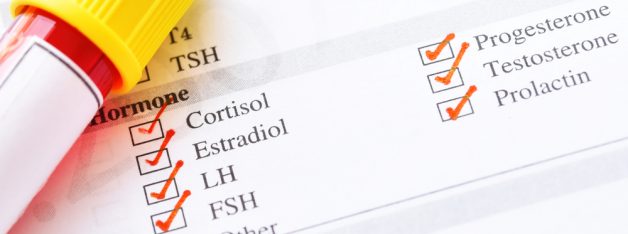How Hormones Cause Acne
This is the second of articles on the 3 causes of acne. To read the next article on inflammation and dietary changes you can make to reduce acne click here. To read the previous article on the microbial causes of acne click here.
How Hormones Cause Acne
There are a number of hormones that contribute to acne. In acne patients certain hormones are correlated with the amount of acne. These include androgens such as dihydrotestosterone and testosterone, dehydroepiandrosterone sulfate (DHEA Sulfate), estrogens, growth hormone, and insulin-like growth factors. Androgens are sex hormones that cause an increase in oil (sebum) production. This excess sebum clogs pores and causes the proliferation of acne-causing C acnes bacteria.
DHEA Sulfate and Acne
This explains the cause of acne in men but does not fully explain why acne occurs in females as well. It has been found that the precursor hormone DHEA sulfate plays a role as well. DHEA sulfate is produced in both males and females and is correlated with the development of acne in teenage girls.
DHEA is available as a supplement and is taken by older people as well as bodybuilders in hopes of supporting the body’s production of sex hormones.
Estrogen and Acne
As for the role of estrogen it may be useful to look at the endocrine disorder Polycystic Ovarian Syndrome (PCOS). In PCOS both androgens and estrogen levels are elevated and acne is a common symptom. Treatment for PCOS can involve the use of oral contraceptive pills (OCPs) which normalize the menstrual cycles in women with PCOS and addresses the hyperandrogenism. This is because OCPs increase the production of Sex Hormone Binding Globulin (SHBG) which lowers free testosterone and reduces acne.
Menstrual Acne
Some women also get menstrual acne which occurs 7-10 days before menstruation. During this phase of the menstrual cycle progesterone is the dominant hormone which causes skin to swell and pores to shut. As menstruation approaches progesterone levels decrease while testosterone levels stay constant. Even though testosterone stays constant it increases relative to the decreasing levels of estrogen and progesterone which causes increases in the production of sebum and therefore, acne.
Growth Hormone, Insulin-Like Growth Factor-1, Diet and Acne
Growth Hormone (GH) and Insulin-like Growth Factor 1 (IGF-1) are two hormones that have also been implicated in acne. These hormones are intimately linked as GH causes the liver to produce IGF-1. Some argue that the cause of acne is entirely the diet as modern people still living as hunter-gatherers do not develop acne. The modern diet is high in processed calories which causes blood sugar to spike which then causes insulin and IGF-1 release as the body tries to metabolize food. Low glycemic diets help reduce IGF-1 levels.
Furthermore, people with Laron Syndrome or GH receptor deficiency do not develop cancer or acne. Laron syndrome is treated with recombinant IGF-1 and this is the only time that they develop acne. This supports the notion that IGF-1 and GH both contribute to acne.
Interestingly, the causative bacteria of acne – C acnes activates your body’s production of IGF-1 and IGF-1 receptors to stimulate keratinocyte production.
Learn more about what dietary changes you can make to reduce IGF-1 and GH levels here.






